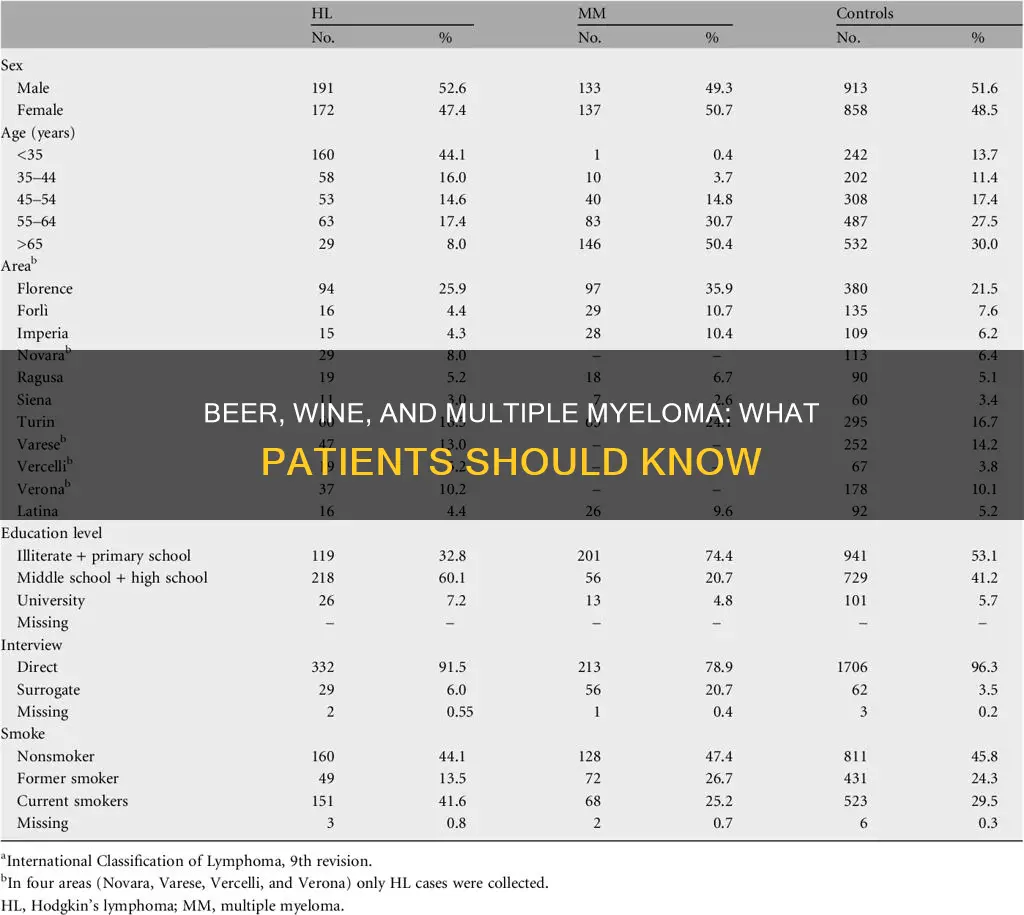
Multiple myeloma is a type of blood cancer that affects the production of healthy blood cells. While there is no definitive research on the impacts of alcohol intake in people with myeloma, it is known that alcohol affects the production of blood cells and bone marrow. It can also worsen myeloma symptoms such as fatigue, gastrointestinal issues, and impaired kidney function.
Some studies suggest that consuming alcohol may reduce the risk of developing myeloma, while others found no association. However, heavy alcohol consumption is linked to an increased risk of other chronic conditions and cancers and can negatively impact the effectiveness of certain myeloma treatments.
Given the potential benefits and risks associated with alcohol consumption for myeloma patients, it is important for individuals to consult their healthcare provider for personalized advice.
| Characteristics | Values |
|---|---|
| Alcohol consumption and multiple myeloma risk | A pooled analysis of 1,567 cases and 7,296 controls found that participants who "ever drank" had a lower risk of myeloma versus those who "never drank". However, there was no relationship to the amount or the number of years of drinking. |
| Alcohol's impact on bone marrow function | Alcohol interferes with the healthy production of white blood cells, red blood cells, and platelets in the bone marrow. For multiple myeloma patients, bone marrow function may already be strained due to the disease and its treatment. |
| Alcohol and fatigue | Alcohol is a sedative and can worsen fatigue, a common symptom of multiple myeloma. |
| Alcohol and gastrointestinal issues | Alcohol can cause irritation to the stomach lining and gastrointestinal tract, similar to the side effects of radiation therapy and chemotherapy. |
| Alcohol's impact on the immune system | Heavy alcohol use is linked to impaired immune function and increased susceptibility to infections, particularly bacterial pneumonia. |
| Alcohol's effect on blood cells | Alcohol can affect the production and health of blood cells, increasing the risk of anemia, low platelet levels, and leukopenia. |
| Alcohol and cancer risk | Drinking alcohol increases the risk of certain cancers, including head and neck, esophagus, liver, colon, and breast cancers. |
| Alcohol's interaction with treatment | Alcohol may interfere with certain chemotherapy drugs and worsen side effects such as a sore mouth. |
What You'll Learn

Alcohol may reduce the risk of multiple myeloma
A pooled analysis of six case-control studies, including 1,567 cases and 7,296 controls, found that participants who consumed alcohol had a lower risk of developing multiple myeloma compared to those who never drank. This association was more pronounced for current drinkers, with a 43% reduced risk in men and a 45% reduced risk in women, but was not observed in former drinkers. However, no dose-response relationship was found, meaning that the amount of alcohol consumed did not seem to influence the risk. Similar results were observed in some cohort studies, but not all.
In contrast, other studies have found no strong association between alcohol consumption and multiple myeloma risk. A systematic review and meta-analysis of 18 studies (eight case-control and ten cohort studies) found a modest protective effect for moderate-to-heavy drinkers, but no overall association between alcohol consumption and multiple myeloma risk.
It is important to note that alcohol can negatively impact multiple myeloma treatment and symptoms, as well as increase the risk of other chronic conditions and cancers. Therefore, it is crucial for patients to discuss alcohol consumption with their healthcare providers and carefully weigh the risks and benefits.
Beer and Gum Grafts: What You Need to Know
You may want to see also

Alcohol can worsen myeloma symptoms
While some studies suggest that alcohol consumption may reduce the risk of developing multiple myeloma, drinking alcohol can negatively impact the treatment and symptoms of those who have the disease.
Fatigue
Multiple myeloma patients often experience fatigue, and alcohol acts as a sedative, so drinking can worsen this symptom.
Infections
Multiple myeloma and its treatments can affect the immune system, making patients more susceptible to infections. Alcohol consumption has also been linked to reduced immune system function, so drinking can increase the risk of infection.
Gastrointestinal issues
Multiple myeloma can cause gastrointestinal issues such as nausea, constipation, loss of appetite, and dehydration. Alcohol consumption can also cause nausea, vomiting, stomach pain, and dehydration, so drinking can worsen these symptoms.
Blood cells and bone marrow
Multiple myeloma is a type of blood cancer that affects the production of healthy blood cells. Alcohol can interfere with the production of white blood cells, red blood cells, and platelets in the bone marrow, which can further impact the health of multiple myeloma patients.
Chronic conditions and other cancers
Drinking alcohol can increase the risk of developing other chronic conditions, such as high blood pressure, stroke, liver disease, and pancreatitis, as well as other types of cancer.
Treatment interference
Alcohol may interfere with certain chemotherapy drugs and can worsen some of their side effects, such as a sore mouth. It is important for multiple myeloma patients to consult with their doctor about alcohol consumption during treatment.
Beer Drinking: Blood Thinner or Thickener?
You may want to see also

Alcohol affects blood cells and bone marrow
Alcohol can have toxic effects on bone marrow, reducing the production of red blood cells, white blood cells, and platelets. Bone marrow biopsies from alcohol-dependent individuals hospitalized for detoxification show heightened ineffective erythropoiesis, impaired iron utilization, and other abnormalities. These toxic effects are reversible, and normal bone marrow cell culture may be a typical feature of alcohol-induced bone marrow damage.
Alcohol also affects the production and health of blood cells. Heavy alcohol consumption can cause a generalized suppression of blood cell production and the production of structurally abnormal blood cell precursors that cannot mature into functional cells. Alcoholics frequently have defective red blood cells that are destroyed prematurely, possibly resulting in anemia. Alcohol also interferes with the production and function of white blood cells, especially those that defend the body against invading bacteria. Consequently, alcoholics often suffer from bacterial infections. Finally, alcohol adversely affects platelets and other components of the blood-clotting system, increasing the risk of stroke.
For patients with blood and marrow cancers, such as multiple myeloma, bone marrow function may already be strained. Alcohol can further interfere with the healthy production of white blood cells, red blood cells, and platelets. Myeloma is a type of blood cancer that increases the risk of low healthy blood cell counts due to an overgrowth of myeloma cells (cancer cells). People with myeloma may experience anemia (a shortage of red blood cells), low platelet levels, and leukopenia (a shortage of white blood cells).
In summary, alcohol can affect blood cells and bone marrow by interfering with the production and function of white blood cells, red blood cells, and platelets. This can lead to anemia, bacterial infections, and an increased risk of stroke. For patients with multiple myeloma, alcohol can further strain bone marrow function and worsen symptoms such as fatigue and gastrointestinal issues.
Drinking Beer on Keflex: What You Need to Know
You may want to see also

Alcohol increases the risk of chronic conditions and other cancers
Alcohol is a known carcinogen and is associated with an increased risk of several types of cancer. Drinking alcohol can increase your risk of developing cancers of the head and neck, oesophagus, liver, colon, and breast. Even those who have no more than one drink per day and binge drinkers have a modestly increased risk of some cancers.
Alcohol consumption is also a risk factor for many chronic diseases and conditions. It can increase your risk of high blood pressure, stroke, liver disease, and pancreatitis. Additionally, alcohol can affect your blood cells and bone marrow, reducing the production of red blood cells, white blood cells, and platelets. This can be especially problematic for people with blood cancers such as multiple myeloma.
The effects of alcohol on cancer risk are not limited to the types of cancer mentioned above. Alcohol consumption has also been linked to an increased risk of melanoma and prostate and pancreatic cancers. The link between alcohol and cancer is so strong that nearly 4% of cancers diagnosed worldwide in 2020 could be attributed to alcohol consumption.
It's important to note that the risk of developing these chronic conditions and cancers increases with the amount of alcohol consumed. Therefore, it's crucial to limit alcohol intake or abstain from drinking altogether, especially if you have multiple myeloma or are undergoing cancer treatment.
Drinking Beer in Public: Where is it Legal?
You may want to see also

Alcohol may interact with myeloma treatment
Alcohol may affect how well your myeloma treatment works. It can interfere with the healthy production of white blood cells, red blood cells, and platelets in your bone marrow. For patients with blood and marrow cancers, such as myeloma, bone marrow function may already be strained due to the disease. Alcohol can worsen this situation, especially when combined with the bone marrow damage caused by chemotherapy and radiation therapy.
Alcohol is a sedative, and it can impact your sleep. If you are already experiencing fatigue as a result of your cancer, alcohol may exacerbate this problem. Additionally, if you are taking medications for pain or nausea, alcohol will enhance their sedative effects.
If you are experiencing nausea as a side effect of radiation therapy or chemotherapy, alcohol can irritate the lining of your stomach and gastrointestinal tract in a similar way. It can also worsen oral mucositis or mouth sores.
Many chemotherapy drugs are excreted by the liver, and the toxic effects of these drugs can strain the organ. Alcohol is also metabolized by the liver, so consuming it while undergoing chemotherapy will place additional stress on your liver and may even cause permanent damage.
It is generally recommended that you consult your doctor or healthcare provider for advice on alcohol consumption during cancer treatment. They will be able to provide guidance based on your specific condition, treatment plan, and goals for your quality of life.
Understanding Beer Bikes: How Do They Work?
You may want to see also
Frequently asked questions
It depends on the individual's condition and treatment plan. While some people with multiple myeloma may be able to drink alcohol in moderation, it is important to consult with your doctor to determine what is safe for you.
Alcohol can worsen multiple myeloma symptoms such as fatigue and gastrointestinal issues. It can also interfere with bone marrow function and increase the risk of other chronic conditions and cancers. Additionally, alcohol may interact with certain chemotherapy drugs and worsen their side effects.
Some studies suggest that light to moderate alcohol intake may reduce the risk of multiple myeloma and other health benefits such as a reduced risk of heart attack and stroke. Red wine and beer contain compounds that may have anti-cancer properties.
Heavy alcohol consumption is linked to impaired immune function and increased susceptibility to infections. It can also cause irritation to the stomach lining, similar to the side effects of radiation therapy and chemotherapy. Alcohol can also negatively impact bone marrow function, which is already compromised in multiple myeloma patients.







